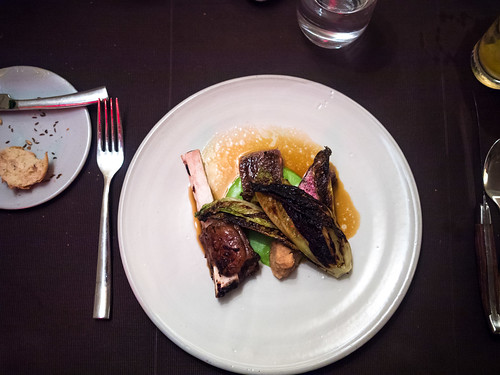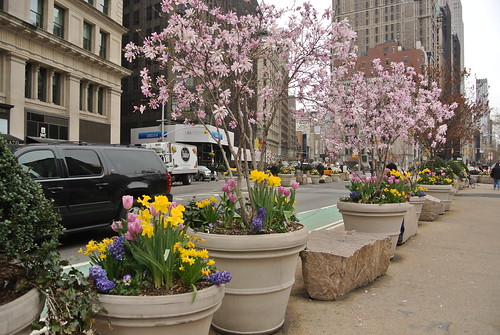- "Trump and the 'Society of the Spectacle'" from The New York Times. This article offers a cultural studies approach to the question we're all asking: how did an ex-reality TV star who starred in Pizza Hut's original ad for stuffed crust pizza become president of the United States?
- "New Brand Identity for Helvetimart by Anagram" from BP&O. Helvetimart is a gourmet food market from Switzerland that recently adopted a novel and refreshingly un-food focused approach to their branding.
- "Macanese Minchi" from The Foodie Baker. I'd never thought much about Macau—until I made this minchi, the country's answer to poutine.
- "A Bright Detroit Rental Loft Full of Local Pride" from Apartment Therapy. This gorgeous Detroit apartment embraces the interaction between the city and the home.
- "12 Contemporary Writers on How They Revise" from Lit Hub. I live by the adage writing is rewriting—even more so after hearing how authors such as Joan Didion and Neil Gaimon approach this sometimes daunting task.
Five Friday Reads 02.17.2017
Editor's note: I'm reviving a favorite feature from my old blog. Each Friday I'll round up five of the most interesting, thought provoking, or just down right entertaining stories I've come across in print and online in the previous week. If you have any recommendations of stories to feature, share them on twitter with the hashtag #ELLFriFive
- Magazine of the week: The New Yorker" from Magculture. As the media work to reconcile a Trump presidency, their visual depiction is just as important as their language.
- "A Liberal Wanted to Agitate Ole Miss from the Inside. He's Succeeding." on The New York Times. From the frontlines of racial tension in America, one Mississippi undergrad is challenging how his peers interact with the world—and each other.
- "Fictional characters make 'experiential crossings' into real life, study finds" on The Guardian. Studies prove that you're not insane for thinking of Hobie every time you step into an antique shop (The Goldfinch anyone?).
- "Writers to Watch Spring 2017: Anticipated Debuts" on Publisher's Weekly. Get ready to see your must-read list grow, from a story about a Bangalore spice business to a family history of Uganda, these authors want to challenge readers with unconventional and thought-provoking narratives.
- "Why I broke my three year clothes buying ban" on Frugalwoods. "I was using my job as an excuse to validate my unnecessary shopping. In doing so, I was subconsciously thwarting myself by–in essence–paying to work."
Learning about fine dining at Betony in New York City
Editor's note: Betony has since closed since my meal there. When I ate there they had already decided to close.
The host at Betony sat the woman in the sequin mini dress first. I wasn’t surprised. Just as I wasn’t surprised to see a trio of dudes hanging by the bar throwing back milk punch and cognac. In New York every restaurant house the pre-club crowd. After all, what better way to coat the stomach against the night’s Grey Goose than with a $100 tasting menu?
But for my boyfriend and I, an average pair of twenty-somethings, dinner at the late Betony was a bargain. It was cheaper than a trip to the theatre or a night at the club and more entertaining than either.
Le Coucou, Günter Seegar, Augustine: meet New York’s new generation of restaurants eager to tutor eaters reared on chef-approved noodle joints on the finer points of high cuisine. From table settings to artful platings, there are plenty of metrics for judging these restaurants. And young diners like us are ready to learn. Restaurant critics might complain, but most diners will agree that plopping down upwards of $100 for a meal earns you the right to critique.
We didn’t love the wood paneling. We debated the table décor in comparison. We discussed whether to follow Pete Well’s recommendation to order the chicken or follow our stomach and order the skate. After all, when you consume more chicken in Chop’t salads than you do chicken from Michelin-starred kitchens, you need to train your palate. Forget paying for entertainment, we paid for education.
Betony offers both a set and a tasting menu, but most diners opt for the set menu. It’s a relative bargain. About $100 gets you an appetizer, entrée, and dessert, plus a smattering of amuse bouche. You can add a wine pairing, but you’d be better off ordering an astonishingly creamy-but-light glass of milk punch or deep and sweet sherry drink. If you insist on wine, choose a bottle or glass from the leather-bound wine list that gives drinking the reverence of an illuminated manuscript.
Betony wants to bridge this gap between past and present, which you realize the moment you climb the steps to the upper story dining room. While downstairs diners snuggle amidst wood paneled walls seemingly stolen from a Vaudeville theatre, upstairs wood panels give way to brick walls from a Williamsburg-themed TV set. If the brick walls are Williamsburg, the tables are Stockholm—large and pale with a sleek lamp in lieu of a candle. Betony wants to remind you that old-school dining remains relevant in the 21st century, even when the symbols shift.
Sometimes you believe and sometimes you wish you swung by the canteen at a living history museum instead. You float aimlessly at the island-like tables—until they’re filled with dishes. You feel fine during your appetizer, awkward until the amuse bouche arrives and filled with just as much shame as food after dessert as you wonder how you ate so much.
That’s because each course is large enough to satisfy on its own. I wish my radish salad hadn’t been soaked in dressing and while I loved my pseudo-fried fish, the combination of crispy roasted mushrooms and rich miso would have been just as satisfying if I’d spent $30 on it as a single course. You become despairing of the amuse bouche, which are the most compelling parts of the meal. The chilled truffle broth dotted with browned butter tastes like dragging your finger through the dregs of the parmesan truffle fries from your go-to gastropub. And who could resist the fresh sorbet that precedes dessert? Bright and pungent, it almost makes you excited about yet another course.
Perhaps that’s the issue with contemporary fine dining—it participates in a dining culture where more means value, shifting the definition of satiation from just enough to too much. While diners at Betony no doubt snuff their noses at Cheesecake Factory portions, the notion that of a bargain alters how we interact with dining. Because we aren’t always fine dining. You’ll swing by Chipotle or the Whole Foods salad bar. Fine dining is an educational experience, it’s a theatrical experience and a gastronomic one. Betony demonstrates the successes and challenges of navigating these different discourses for the 21st century diner.
And I wish I could go back.
How focusing on scent improves your daily routine
In Monocle Forecast, branding strategist Hugo Macdonald wrote an essay decrying the decline of texture and praising the designers creating products that stimulate touch. He argues that the iPhone’s glossy surface fosters thoughtlessness, whereas sticky key pads forced us to contemplate every number we dialed. But smooth touchscreens aren’t the only technology disfiguring our sensory environments. Backlit screens, noise-cancelling headphones, and artificial sweeteners all change how we see, hear, and taste the world. Yet I’d argue that scent is the most endangered sense. We barely notice it at all.
Perhaps that’s unfair. We do notice scent, but usually when passing a garbage truck in mid-August and not when peeling open a brand-new magazine. This is unfortunate but understandable. Research suggests that we remember negative events better than positive ones so it stands to reason that we’d notice yucky smells over pleasant ones.
Society wants to annihilate unpleasant odors—or at least replace them with less gross ones. From Febreeze to Glade candles, marketers try to convince us that a musty smell begets a messy life. Inoculate your kids against the sulfurous smell of over-boiled broccoli with a plug in de-odor-ifier! If there’s a bad smell you can think of, there’s a product engineered to smother it.
Even cities attempt to erase smell. Complaints about food trucks frequently relate to the aroma of freshly grilled burgers wafting into nearby offices, causing unsolicited hunger pangs. Shops douse their stores in scents to lure in unsuspecting customers. While such actions might not fall under the category of deodorizing, they support the trend against natural aromas.
How did this trend evolve? The history of scent is a complicated with experts writing histories and arguing how a Viking town would have smelled. I am not an expert. But even a cursory glance at the history of scent demonstrates that eschewing natural smells is an invented fetish, one that has quite a bit to do with class.
Before marketers convinced us that a daily lather ensured both personal hygiene and spiritual well-being, cleanliness was an upper-class privilege. Yet we wouldn’t perceive these elites as pristine. Cleanliness was constructed through oils and herbs that doused onto clothes and handkerchiefs or contained in pomanders to sniff if a particularly smelly individual approached. Just think of smelling salts, which used aroma to help coerce people out of fainting spells. Even today, natural aromas are expensive, which emphasizes just how precious these compounds were—and how the elite must have prized them.
Yet it’s not just the monetary divide that characterizes the history of scent, but the lauded scents themselves. Rosewater, cloves, ambergris—the smells our ancestors fetishized weren’t pumpkin spice compounds or engineered to evoke memories of sea breezes. They acknowledged that pleasure existed in nature, even if it could be kinda stinky sometimes.
If only we could appreciate this today! Unfortunately, scent, like touch, is endangered. Consumer society stigmatizes anything other than the perfectly engineered compounds it produces. Why mess with a bouquet of real flowers (or, god forbid, a garden) when you can buy the experience with a one-touch whole room aromatizer? Erasing bad smells isn’t dangerous only because it separates us from the routine yuckiness of being human, but also because it inoculates use to the good aromas we encounter daily. Whether it’s the scent of freshly ground coffee at your favorite a café or the icy smell your loved one wears when they arrive home after work on a cold night, scent is one of our most basic ways of interacting with and appreciating the world. Let’s enjoy it.




